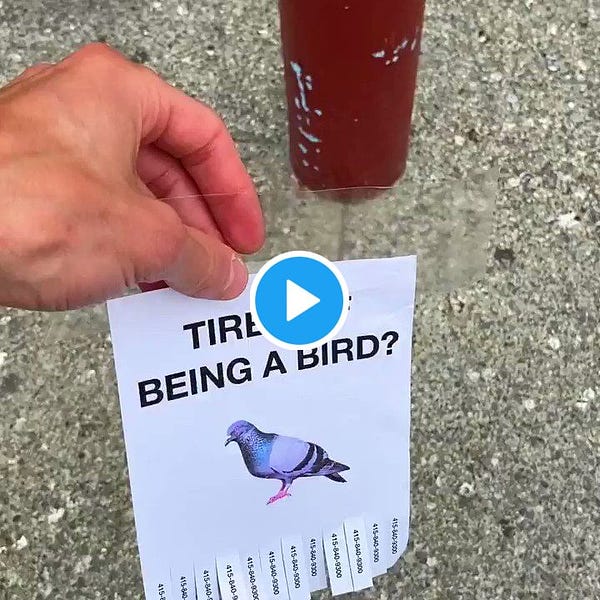It's not you, it's us
In this edition: Susan Orlean, Andy Ngo, virtual beings and death start-ups
During a week in which Facebook was rightly clobbered for all
sorts of malfeasance & neglect, a small anecdote from Casey Newton oddly stuck most in my head. As some of you might’ve seen, the New York Times’ Kevin Roose tracks the top news stories that trend each day on Facebook. And they are, inevitably, grade-A garbage: partisan blogs, bad memes, overt propaganda.
But Newton reported that people at Facebook are upset about these lists. Not because they’re inaccurate, per se, but because they track the stories users most engage with, instead of the stories that Newsfeed shows to them. By that latter measure, the trending stories are far less dumpster-fire, far more down-the-middle.
In other words, Facebook is providing quality information. It’s just that people *seek out* the stupid, the inflammatory, the misleading and the partisan.
There is no doubt that the platform dynamics of Facebook encourage this behavior. (Regular Links fave Whitney Phillips just wrote an essay on this for Wired.) But the tale of the competing Facebook trends also points to an underappreciated flaw in social platforms: They are used by humans, and humans are terrible.
To wit: This week Twitter made news by banning 7,000 QAnon accounts. QAnoners (QAnonists? QAnonians?) promptly moved to other networks or otherwise evaded the ban. Facebook also suspended several large antimask groups earlier this week for spreading covid misinformation. But there are still dozens and dozens of antimask groups on the site that — predictably! — just went private.
Could Facebook stomp these out? Yeah, maybe. And there are good arguments it should. But surely we don’t think this clown will ultimately fix the internet-augmented flaws of human nature.
As always, you can help Links by telling your friends — or enemies? I’m not picky! — to subscribe. I really, truly appreciate it. Everyone could use more links in their life.
If you read anything this weekend
This delightful interview with Susan Orlean, a tipsy ray of light in our time of darkness. The moral of this story — like so many others — is to never drink rosé on an empty stomach. [WaPo]
This profile of Andy Ngo, icon of the anti-woke culture wars. The brilliance of this piece (on Ngo, but also right-wing stardom & modern media dynamics) is that you actually leave feeling … bad for him. [Buzzfeed]
This belated reappraisal of email as a communications medium. Complain about Zoom all you want. Asynchronous messaging is a bigger problem. [New Yorker]
This pair of alarming histories on white women in the hate movement. Come for the feminist-turned-“tradwife,” stay for truth bombs dating back to women’s suffrage. [Jezebel & Written Out]
This wild and only slightly unsettling dispatch from the Virtual Beings Summit. “Covid-19, it was suggested, has made virtual beings of everyone.” But not quite like this! [Wired]
Postscripts
An art critic takes on Cuomo’s “vintage propaganda” poster. TikTok gets the Vanity Fair treatment. How stupid are dogs, really? (Unfortunately … pretty stupid.) The end of the “workplace family” myth. Can’t have a “song of the summer” in a summer this bad. (You CAN have an app of the summer, though!) P.S.: Dr. Fauci did not say that.
How to spot fake Amazon reviews. How (not?) to date in a pandemic. Planet Money’s TikTok and this cookie generator are my current top obsessions. (H/T Deez Links for that.) Rethinking travel when it returns. The Canadian ecommerce site that rivals Amazon. Last but not least, two antithetical pandemic trends: inflatable pools and … death start-ups.
That’s all for this week. Take care. Until next week!
— Caitlin






